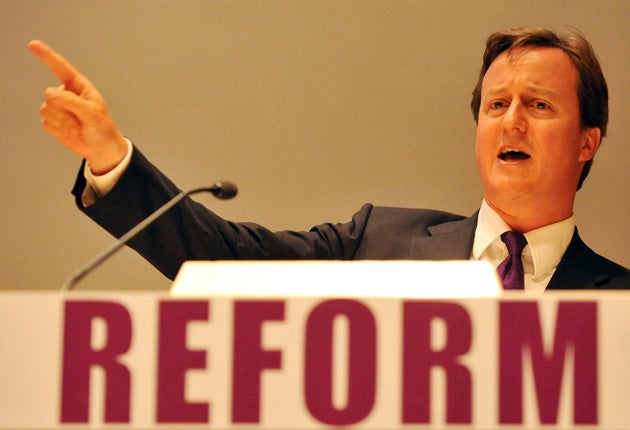End of the blame game: Tories to sack ministers for failings of quangos
Cameron pledges to make politicians responsible for tough decisions again

Ministers in a future Tory government will be sacked if quangos under their control are found to be failing, as part of a plan to tackle the huge cost and lack of accountability of the public bodies.
In a speech detailing his intention to slash the number of quangos, or "quasi-autonomous non-governmental organisations", and publish the salaries of their highly paid bosses, David Cameron said ministers would no longer be able to hide behind quangos' "cloak of independence".
Taxpayers were forced to shell out £34.5bn on major quangos last year, up 12 per cent on the previous year. Senior Tories suspect the rise has been fuelled by Labour's attempts to use the bodies to insulate it from unpopular decisions. All members of the Shadow Cabinet have been ordered to examine which quangos could be cut down or axed altogether. "Even when power is delegated to a quango, with a Conservative government, the minister will remain responsible for the outcomes," said Mr Cameron. "They set the rules under which the quango operates. And they have the power to ensure those operating the quango are qualified to do the job."
The Tory leader pledged to scrap the Qualifications and Curriculum Development Agency (QCDA), responsible for developing the national curriculum. He said its decisions placed it "at the heart of political debate and public controversy".
Michael Gove, the shadow Schools Secretary, blames the agency for the controversial decision not to make children learn about important events in British history. "Responsibility for the national curriculum should be brought back into the Department for Children, Schools and Families, so accountable politicians can directly enact the promises they make," Mr Cameron said.
However, the Tory leader provoked an angry response from Ofcom, Britain's telecoms industry regulator, after saying it would "cease to exist" in its present form if he won the next election. The shadow Culture Secretary, Jeremy Hunt, has been unhappy that Ofcom had a major say in the future of regional TV news and Channel 4. A spokesman for Ofcom said the regulator had saved the public more than £117m over five years as a result of merging five regulators in 2004. The Culture Secretary, Ben Bradshaw, said Mr Cameron had misunderstood Ofcom's role, which was to advise.
Both Labour and the Tories see slashing quangos as a way to make "acceptable" spending cuts, although government sources said the rise in spending on quangos was a sign of greater investment in public services as well as the cost of planning for the 2012 Olympics. Senior Labour figures accused the Tories of misleading the public, claiming they had promised to create 17 new public bodies should they win the next election. Liam Byrne, Chief Secretary to the Treasury, said he had already ordered a review of the public bodies.
Fall guys? They took a bullet for the boss
*Ken Boston, former head of the Qualifications and Curriculum Authority (QCA), resigned after the breakdown of last year's Sats tests. However, he later accused the Schools Secretary, Ed Balls, of failing to admit the Government's role in the failure.
*Mark Haysom, the former head of the Learning and Skills Council, stepped down in March after high-profile school building plans ground to a halt.
*Derek Lewis, former boss of the British Prison Service, was sacked by the then-home secretary Michael Howard after a scandal in 1995.
Join our commenting forum
Join thought-provoking conversations, follow other Independent readers and see their replies
Comments
Bookmark popover
Removed from bookmarks